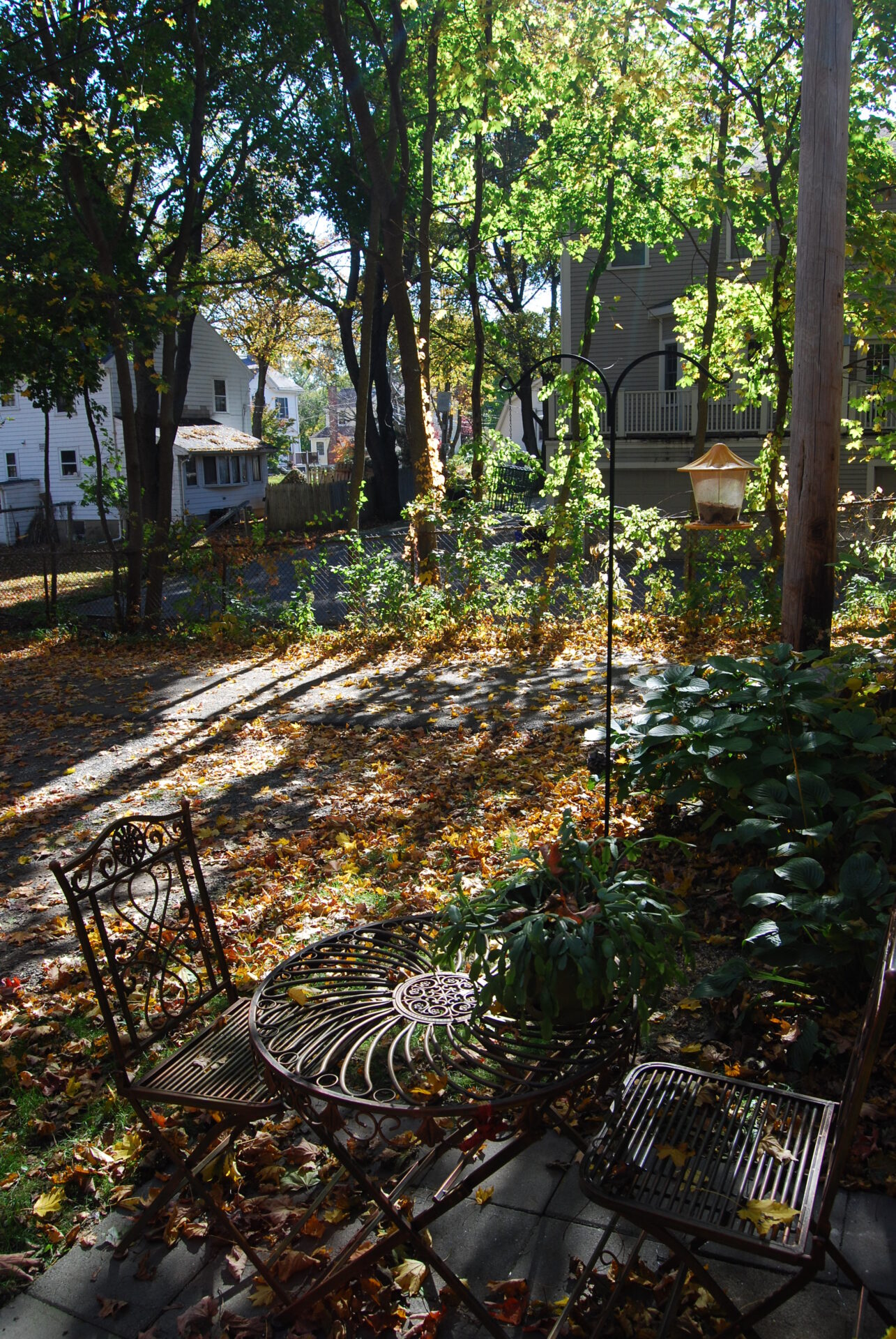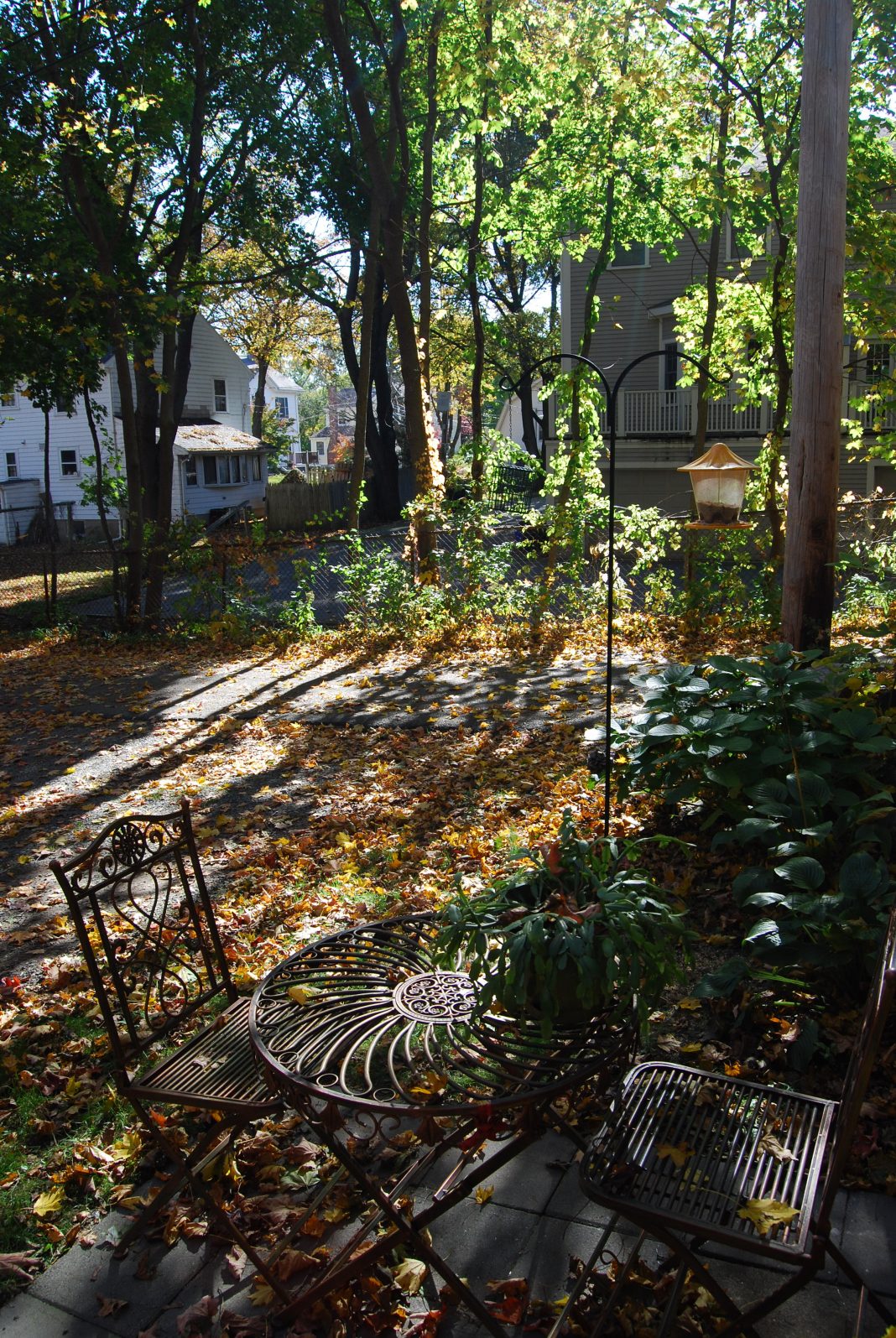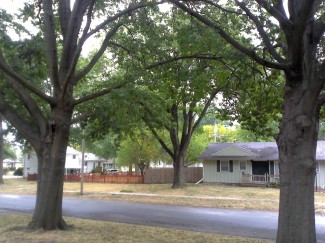LEXINGTON, Mass. — It is not a porch, but a long cement slab that stretches the width of our home, which we make on the lower level of a small brown house, half underground, half exposed to light and wind. Our landlord tells us that this was once a carriage house. We live where the horses lived a hundred years ago; our upstairs neighbor lives where the carriages were kept.
This is the Lexington of Paul Revere’s ride and the first battle of the American Revolution. The homes along Massachusetts Avenue are painstakingly restored and expanded, with date plaques and sixteen-paned windows. On Patriots’ Day people unfurl ten-foot flags for the parade and drink cocktails on their lawns. But the houses on our private way are small and modestly kept. Our neighborhood is hidden; we’re not sure how we found it. We give complicated directions to our dinner guests.
From the slab, which we call a patio, I sit in a wire chair and look across the private way at my neighbors’ back yards: at stakes for tomato plants, scaffolding to shingle rooftops, a low white shed with a hollow beneath it–home of a wood chuck who has, thus far, intimidated us from planting vegetables. Today, over the wood chuck’s shed, an orange sugar maple is losing leaves slowly, as if it has all year to sift them across our gravel drive.
Straight back, through thinning autumn boughs and gaps in a cedar hedge, I see flashes of light, hear squeaking and spinning, voices in snatches, carried through the crisp air. The Minuteman Bikeway runs behind our house, stretching east to Cambridge and Alewife Station (the western end of Boston’s Red Line) and west to Bedford. Before reaching its terminus, it crosses the street where my husband works. When it is warm enough, Christopher takes to this wooded corridor and glides to work on his bicycle.
Beyond the Minuteman are meadows, almost 200 acres of marsh grass, black mud and brittle birches. There are boardwalks out over the bogs. In the summer, if you stand by a dark pool long enough, you realize that there are dozens of frogs, right below you, looking up, encamped on islands of grass. As you raise your eyes, finches move from one low bush to another, as if to elude you. If you are very still, you may see the weasel sliding under a mossy stone wall, never taking his gleaming eyes off of you.
They tried to build in the meadow, before Boston was much of a city, before the revolution. Colonist foundations sunk into the soft mud, cellars filled with water. They gave up and pastured cattle and harvested the peat. Eventually, the city of Arlington procured the meadow to use as part of a reservoir. They could flood it again at any time.
It looks like a body of water, sometimes, if I let my mind wander long enough, standing on the Minuteman behind the Waldorf School, looking through a gap in the trees. Tall grasses move in swells beneath the wind, gulls hover, wooded knolls rise above the tides. In the winter, on a clear day, the palette is right: pale blue and tawny yellow. This is a salt marsh, I say, letting the wind strike my face. The bay is just around the bend, and the harbor. Even now I can hear sailboats knocking against their moorings, the scraping tide of swaying branches and currents of traffic on Massachusetts Avenue. 
We did not know about the Minuteman or the meadow when we signed the lease for this apartment. Christopher and I moved from a harbor town in Rhode Island, inland and north, so he could work as an oceanographer. We are not from here.
We are not from anywhere, actually. We are the young people you write about, here on the Front Porch blog, who don’t have a hometown. I could tell you about my seven childhood moves, all before high school, all to places where neither of my parents had any relatives. I could tell how my husband hardly remembers living in the place where he was born. But we both arrived in Rhode Island and that is where we met. I returned to Rhode Island, by choice, after college in Virginia. He came back twice, first from Germany, then Malawi. We chose the ocean as our anchor-hold, the Rhode Island coast as our home.
We live in Lexington now, not Rhode Island, and we came here because we could both get better jobs closer to Boston. We are philosophically opposed to moving for work, but we did it anyways. My sister is up here too, now, for the same reason. She says in a few years we’ll go back. All of us. We will make jobs for ourselves that we can’t imagine now. We will reclaim our chosen home.
In the meantime, we live here. This is my third autumn in Lexington. On the weekend I bury crocus and tulip bulbs in the yard and think about splitting the irises I planted last summer. Christopher refills our bird feeders. We talk to our neighbors when they get their mail. We walk to the town center to get espresso and check books out of the library. We make plans for dinner. And from this patio, as we insist on calling it, we observe the slide of seasons, one after another, the changes in the trees, our resident birds, and the slant of the light across our driveway.
–Hannah Piecuch
FPR is looking for portraits of life in your communities, no matter how plain or quotidian. Want to share one? Just e-mail a photograph of the view from – not of – your front porch to frontporchviews@gmail.com, together with a written reflection of no more than a few hundred words. Writing may be lightly edited. We’ll gladly withhold your name if you ask us to.












I love the way your writing helps me see what you see, and know a little bit about you as well. I realized something, too. I’ve never seen a woodchuck, although I’ve often wondered how much wood a woodchuck would chuck if he could. I guess we don’t have them here in the south.
Beautiful writing, Hannah! I empathize with the longing to find home and feeling displaced no matter where you land. And I too philosophically agree with your dislike of moving for jobs–it does feel that something of the adventure is lost when the motivation is pecuniary.
Miss Hannah,
It is said of the Greeks as the colonized the Mediterranean basin that they had acquired, internalize and so lived out the traditions, customs and habits of the homestead, often homesteads separated from them by generations, that they took the homestead with them in their hearts, in their bearing and in their relationship to their new environment, planting a part of that homestead of the heart in a new idiom. Y’all have obviously done this. A salute and a God bless!
Hi my grandchild,
Looked forward to the day when I could read you writings. From early on I always knew that you could do it.
It was so enjoyable to read.
Congratulations,
Love,
Grampy and Grammy Clarkin
Comments are closed.